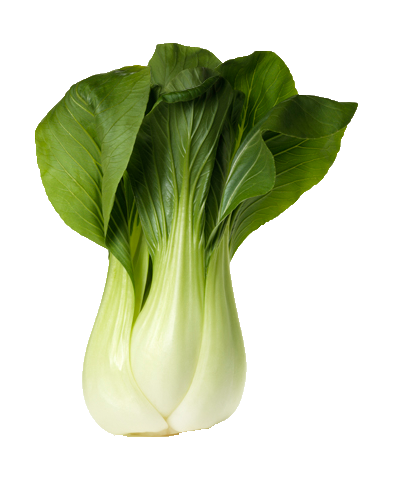|
Bok choy is one
of the popular leafy-vegetables very low in calories. Nonetheless, it is very
rich source of many vital phyto-nutrients, vitamins, minerals and
health-benefiting anti-oxidants.
100 g of bok choy
provides just 13 calories. It is one of the recommended vegetable in the zero
calorie or negative calorie category of foods which when eaten would add no
extra weight to the body but in-turn facilitate calorie burns and reduction of
weight.
Like other brassica
family vegetables, bok choy contains certain anti-oxidant plant chemicals like
thiocyanates, indole-3-carbinol, lutein, zeaxanthin, sulforaphane and
isothiocyanates. Along with dietary fibre, vitamins these compounds help to
protect against breast, colon, and prostate cancers and help reduce LDL or
"bad cholesterol" levels in the blood.
Fresh pak choi is
an excellent source of water-soluble antioxidant, vitamin-C (ascorbic acid).
100 g provides 45 mg or 75 % of daily requirements of vitamin C. Regular
consumption of foods rich in vitamin C helps body develop resistance against
infectious agents and scavenge harmful, pro-inflammatory free radicals.
It has more
vitamin A, carotenes, and other flavonoid polyphenolic anti-oxidants than cabbage,
cauliflower...etc. Just 100 g of fresh bok choy provides 4468 IU or 149% of
daily-required levels vitamin A.
Pak choi is very
good source of vitamin K, provides about 38% of RDA levels. Vitamin-K has
potential role in bone metabolism by promoting osteotrophic activity in bone
cells. Therefore, enough vitamin K in the diet makes your bone stronger,
healthier and delay osteoporosis. Further, vitamin-K also has established role
in curing Alzheimer's disease patients by limiting neuronal damage in their brain.
Fresh bok choy
has many vital B-complex vitamins such as pyridoxine (vitamin B6), riboflavin,
pantothenic acid (vitamin B5), pyridoxine, and thiamin (vitamin B-1). These
vitamins are essential in the sense that our body requires them from external sources
to replenish.
It also contains
good amount of minerals like calcium, phosphorous, potassium, manganese, iron
and magnesium. Potassium is an important component of cell and body fluids that
helps controlling heart rate and blood pressure. Manganese is used by the body as
a co-factor for the antioxidant enzyme, superoxide dismutase. Iron is required
for the red blood cell formation.
Cancer: Bok choy and other cruciferous vegetables have been found to
possess certain anti-cancer properties. Several population studies have shown
that people who eat more cruciferous vegetables have a lower risk of developing
lung, prostate, colorectal and breast cancer. The glucosinolates found in these
vegetables are converted into isothiocyanates in the body, and these compounds
help the body fight cancer.
Bok choy contains folate, which plays a role
in DNA synthesis and repair, thus preventing the formation of cancer cells from
mutations in the DNA.1 Vitamin C, vitamin A and beta-carotene function as
powerful antioxidants that help protect cells against free radical damage.
Selenium is a mineral that is not present in
most fruits and vegetables, but can be found in bok choy. It plays a role in
liver enzyme function and helps detoxify some cancer-causing compounds in the
body. Additionally, selenium prevents inflammation and also decreases tumour
growth rates.
Bone health: The iron, phosphorous, calcium, magnesium, zinc and vitamin K in
bok choy all contribute to building and maintaining bone structure and
strength. Iron and zinc play crucial
roles in the production and maturation of collagen. Though phosphorus and
calcium are both important in bone structure, the careful balance of the two
minerals is necessary for proper bone mineralization - consumption of too much
phosphorus with too little calcium intake can result in bone loss.
Low intakes of vitamin K have been associated
with a higher risk for bone fracture. Adequate vitamin K consumption is
important for good health as it acts as a modifier of bone matrix proteins,
improves calcium absorption and may reduce urinary excretion of calcium.
Blood pressure: Potassium, calcium and magnesium (all present in bok choy) have
been found to decrease blood pressure naturally.
Maintaining a low sodium intake is essential
to lowering blood pressure, however increasing potassium intake may be just as
important because of its vasodilation effects. According to the National Health
and Nutrition Examination Survey, fewer than 2% of US adults meet the daily
4,700 mg recommendation.
Heart health: Bok choy's folate, potassium, vitamin C and vitamin B-6 content,
coupled with its lack of cholesterol, all help to maintain a healthy heart. In one study, those who consumed 4,069 mg of
potassium per day had a 49% lower risk of death from ischemic heart disease
compared to those who consumed less potassium (about 1,000 mg per day). Vitamin
B-6 and folate prevent the build-up of a compound known as homocysteine. When
excessive amounts of homocysteine accumulate in the body, it can damage blood
vessels and lead to heart problems.
Inflammation: Choline is a very important and versatile nutrient in bok choy
that helps with sleep, muscle movement, learning and memory. Choline also helps
to maintain the structure of cellular membranes, aids in the transmission of
nerve impulses, assists in the absorption of fat and reduces chronic
inflammation.
Immunity: The selenium found in bok choy has also been found to improve
immune response to infection by stimulating production of killer T-cells.
Skin: Collagen, the skin's support system, relies on vitamin C as an
essential nutrient. Vitamin C works in our bodies as an antioxidant to help
prevent damage caused by the sun, pollution and smoke. Vitamin C also promotes
collagen's ability to smooth wrinkles and improve overall skin texture.
Consuming fruits and vegetables of all kinds
has long been associated with a reduced risk of many lifestyle-related health
conditions. Many studies have suggested that increasing consumption of plant
foods like bok choy decreases the risk of obesity, diabetes, heart disease and
overall mortality while promoting a healthy complexion and hair, increased
energy and overall lower weight.
|

